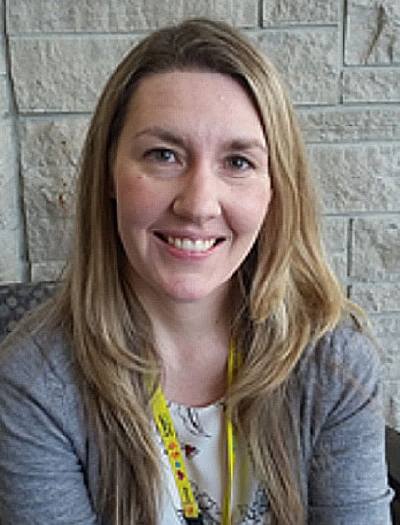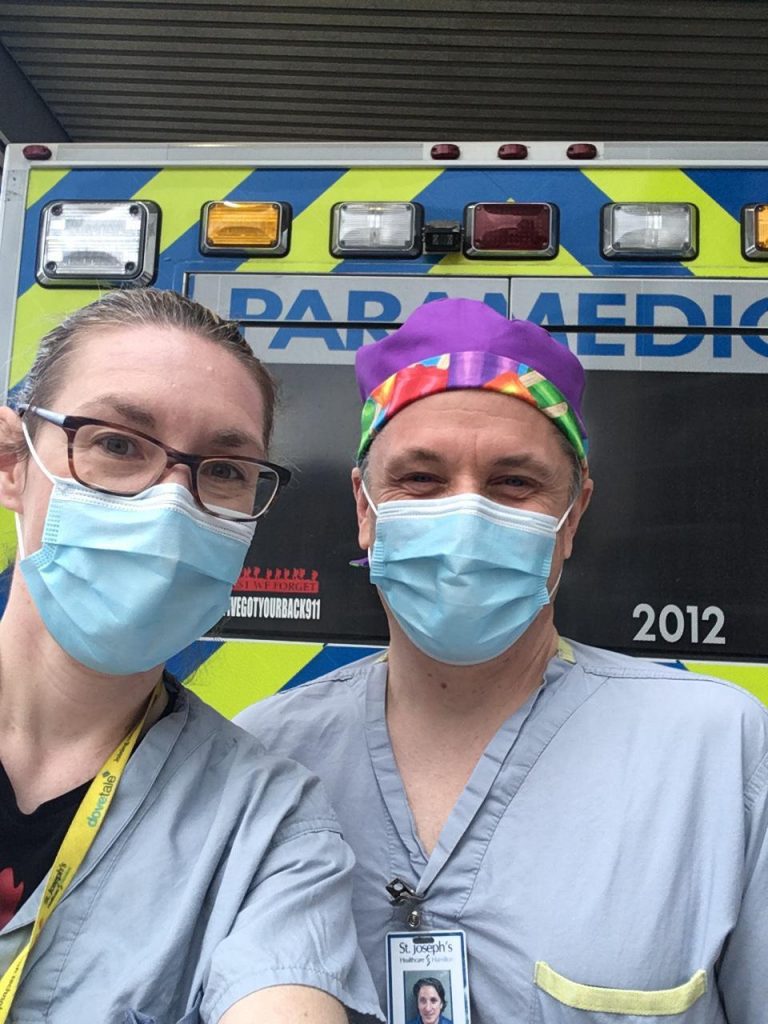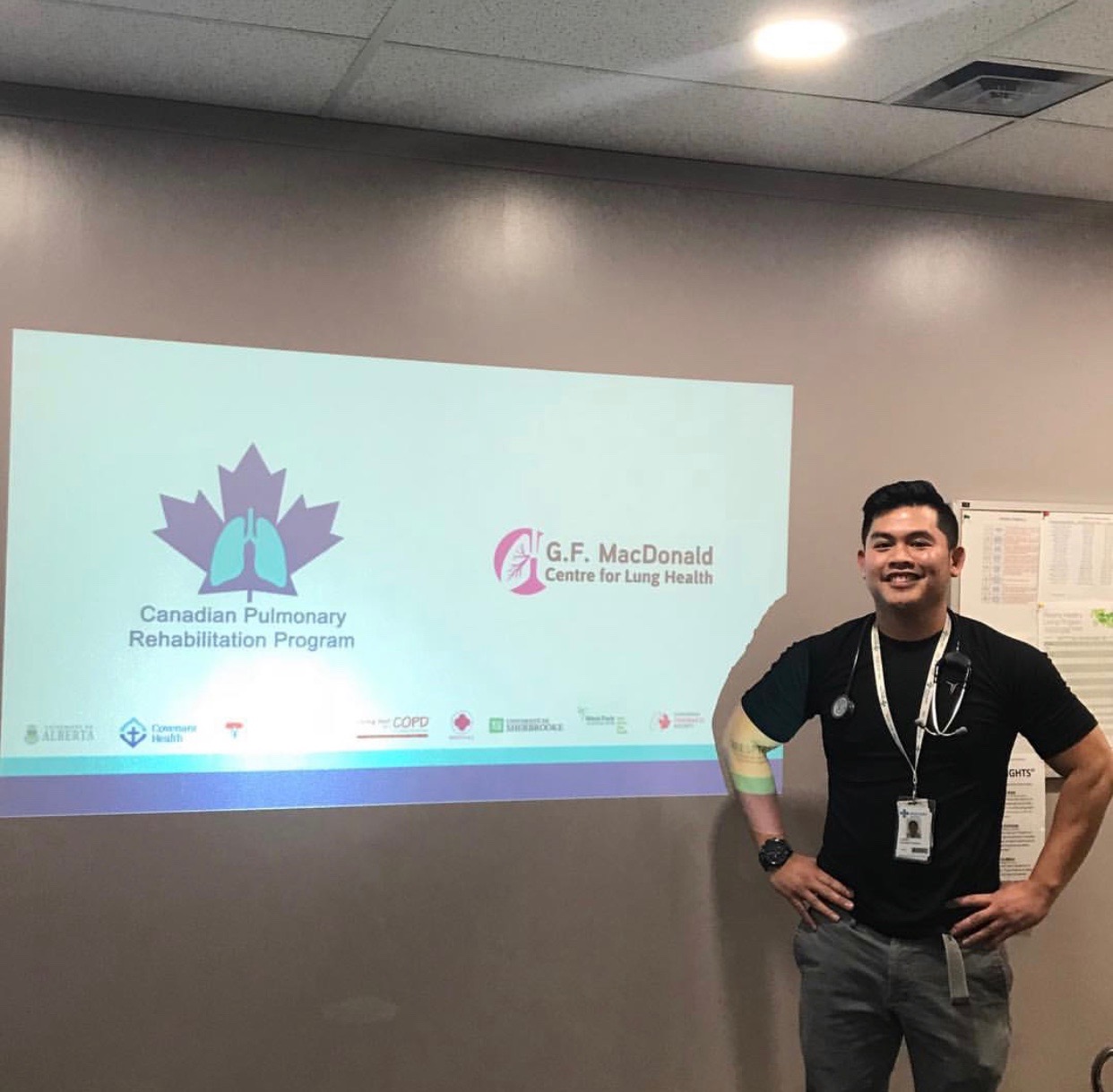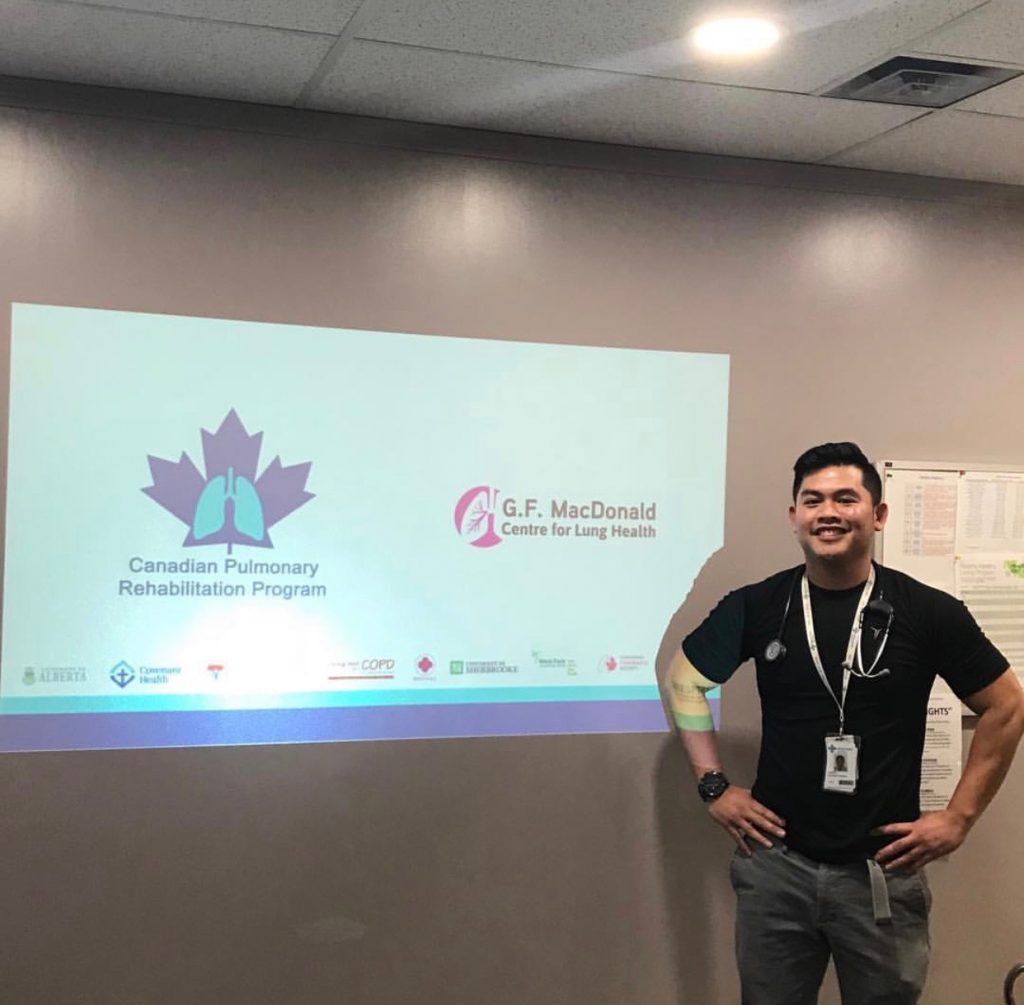
RRT FCSRT MEd
khassall@stjosham.on.ca
Experiencing asthma and a family history of Berylliosis exposed Kelly Hassall to the importance of respiratory health and set her on a path to become a quality respiratory therapist. Through this journey, Kelly has tried various roles including clinician, educator, manager, and leader. I had seen Kelly as a presenter at conferences, however, it was not until my volunteering at RTSO where I officially met her. She is driven and knowledgeable and has the ability to look at things with a wide lens. Kelly is well known to the RT community so I reached out to Gino De Pinto to hear his thoughts on our interviewee. The following introduction is by Gino De Pinto:
I have had the pleasure of knowing Kelly for the past 14 years. We have worked together to educate students through the early days of clinical immersive simulation, help navigate student placements and most recently on various projects with the RTSO. Kelly has always been solution orientated, innovative and a true respiratory therapy leader. Over the past few months this quote from Rosalene Glickman sums up Kelly’s work as a leader in our profession.
“Every situation – even a disaster – is an opportunity to be your best.”
Rosalene Glickman, Ph.D.,
Our profession was lucky to have Kelly at her best advocating for pandemic pay, organizing timely relevant webinars and providing pertinent resources during the first wave peak of the COVID 19 Pandemic. I’m happy to call Kelly a mentor and a friend. The RT world would definitely benefit for having more Kellys pushing the profession forward.
Thank you Gino for this lovely introduction. Now please join me in the interview with Kelly.
Let’s start with one of my favourite questions to ask. I am curious to find out how people find out about our profession and why they decided to study respiratory therapy. How was the journey for you?
Having spent a large majority of my childhood learning to control my asthma while watching my father struggle with Berylliosis, I had great respect for the number of health care providers who dedicated their careers to helping those with respiratory ailments have a better quality of life. I wanted to give back to a community that had given so much to me and my family. From a young age I knew I was going to work in healthcare specializing in respiratory care and management in some way shape or form. I had the great fortune of graduating high school the year that Queen’s University and the Michener Institute for Applied Health Sciences started offering a combined Bachelor of Sciences in Life Science and Diploma in Respiratory Therapy program. I was looking into the Queen’s Life Sciences program as a “stepping stone” to medical school. This collaborative program seemed like a great fit as an introduction into the management of respiratory health. Initially, I viewed the profession of Respiratory Therapy as a gateway into the healthcare world, as I learned more about the profession and completed my clinical year, I was inspired to begin working clinically as an RT and decided this was the profession for me.
Once you decided on respiratory therapy as the profession for you, where did that journey take you?
I’ve been extremely fortunate throughout my career to date to work with an amazing assortment of clinicians in a variety of settings. I completed my clinical year in Hamilton and Toronto and learned a lot from my fantastic clinical instructors, preceptors and clinical experiences. Immediately after graduation, I began my RT career in the NICU at Mount Sinai Hospital in Toronto. I worked there in a variety of roles for over 14 years. In addition to my time at Mount Sinai, I worked at Toronto Western Hospital as a casual for a short period and then shifted my focus to interprofessional education and training. I began working in the Simulation Center at Mount Sinai Hospital and then joined the faculty at Conestoga College for the first few years of the RT program. Upon returning to clinical full-time, I decided to enroll in a Master’s of Education program and focus on clinical education while exploring the realm of research. I’ve lectured for residents and fellows in the McMaster and University of Toronto medical programs as well as a variety of interprofessional colleagues. Somewhere in all there I did work for a brief period of time as a clinical per diem for Masimo. That role was interesting as I had an opportunity to learn about the American medical system and help out at a few installs across the border. I also became an NRP, BLS and First Aid instructor which gives me a chance to teach the public as well as a variety of clinicians. In 2017, I moved to St Joseph’s Healthcare in Hamilton where I currently hold the title of Clinical Resource Leader of Respiratory Therapy and work with an outstanding team. Throughout this time I’ve also had various opportunities to work with the CRTO, the RTSO and the CSRT in various capacities to promote the profession, assess peers and assist with professional development.
In terms of memorable moments…what happens on shift stays on shift…that being said I am most grateful for the many inspiring leaders and clinicians that I have had the opportunity to work with and learn from. I’m also extremely grateful for the various opportunities I’ve had to attend conferences and workshops…the most memorable of which would be a tie between an European Conference I attended in Portugal in 2013 (my colleague and I met Jane Pillow and she offered us a chance to work with the sheep in her lab) and the AARC in Las Vegas in 2018 (the keynote was ZDogg…amazing!). I would also be at a loss if I were not to point out the pride in seeing some former students step up to the plate over the past few months to not only show up to work but go above and beyond with clinical practice suggestions, food drive fundraisers and support of their profession.
Learning about your wonderful journey gave me the same reaction of awe and admiration, which is similar to when I get to meet and listen to inspiring presenters in conferences. Not surprisingly, you are a frequent speaker at various conferences.
As you mentioned, you have worked in various roles. What can you tell me about your clinical roles?
To me, one of the most amazing things about Respiratory Therapy is how diverse our profession is. There isn’t a day that goes by that I don’t learn something new. For years I specialized in Women’s and Infants’ Health. The first day I stepped into the NICU I was petrified…the patients were so small and it seemed as though I had so much to learn. Over the years this area of care along with Labour and Delivery became my second home. The challenge of arriving at a delivery never fully knowing what to expect and the many valuable opportunities to work with and learn from the rest of the interprofessional team made the clinical environment engaging and extremely rewarding. For the most part, the successes would outweigh the challenges. When I moved to Hamilton I began to spend more time in the adult world and I’ve spent the past three years learning so much from my colleagues. The day that I observed the ICU team stop rounds to go in and sing “Happy Birthday” to a patient was the day that I realized that it’s not the clinical area or patient population that matters to me, it’s the clinicians working together to provide the optimal care for each person and the environment of respect and trust that this creates that makes the time I spend away from my family worthwhile.
In your opinion what makes a person a quality RT?
When I reflect on the RTs that have inspired me the most, the traits that come to mind are respect, critical thinking, trust and resilience. No matter where you are in your journey as an RT, whether it’s a student entering clinical or a 30+ year veteran gearing up for retirement, there’s always an opportunity to learn, to reflect and to adjust your practice. The clinicians who have inspired me the most are not afraid to admit when they are being faced with a challenge beyond their experience and are quick to seek resources or help. Instead of backing away from a challenge they often step up and look for ways to find a solution. They stand up for what they believe in and never throw anyone “under the bus”. They also take the time to say thank you and to acknowledge the efforts of others.
How did you get involved with the leadership role? What are some elements about your role that you enjoy the most?
I have crossed paths with the realm of leadership in various capacities over the years. When I was alerted that there was a posting in Hamilton for a full-time RT leadership position it seemed like the right time to try something new. Fortunately the team at St. Joseph’s Healthcare Hamilton felt that I was the right fit for their needs and here I am. I enjoy the challenge of getting to know all the various care areas and working with various members of the interprofessional team to ensure that they are supported. I work with an amazing group of RTs, AAs and Pulmonary Techs. I rely on them heavily to help me understand the clinical challenges that are being faced in each area and what I can do to support their needs and enhance patient care. Since joining the team at St. Joseph’s Healthcare Hamilton, we’ve implemented an electronic charting system, moved to Bubble CPAP in our Special Care Nursery, started weekly interprofessional simulation events in our ED, evaluated ventilators and now we’re in a pandemic. It has certainly been an interesting few years.
I also am extremely grateful to have a fantastic manager who is extremely supportive in assisting me navigate the many considerations that need to be made when trying to optimize support for the RTs while working interprofessionally and collaboratively throughout an organization. I would be at a loss if I didn’t mention the RT students. A significant part of my role is to support RT students during their clinical year. I wouldn’t be where I am today without the support of the clinical instructors who supported me through my clinical year thus it’s nice to have a chance to give back to the profession by supporting the students entering our profession as well.
One of the ongoing themes in your roles is your interest, willingness and involvement in teaching and mentorship. What advice do you have for RTs and preceptors to better assist students in their growth? Then turning the table, what advice do you have for students for maximizing their learning and growth?
No one enters into this profession to do harm. Every student who comes through the doors has spent several years preparing for this clinical experience and is striving to achieve a level of competence as an entry to practice RT. Every student is also a human with past experiences and a life outside of clinical. When you are with a student, don’t assume. Ask them what their goals are for the day, let them know it’s okay to say when they don’t know something and provide them opportunities to grow in a safe environment. They will make mistakes, they will forget things and they will misunderstand…just like we all do throughout our careers. Be clear with your expectations and timely with your feedback. It’s impossible to adjust behaviour if you are not aware of the adjustments that need to be made.
Students, you are not expected to be perfect but you are expected to be engaged and play an active part in your learning. I would rather work clinically beside the RT who scored 65% on their composite exam but took the time to understand where they lost the 35% and how to do things differently the next time than the RT who scored 85% and never took the time to review the 15% they could have improved upon. Treat each day as an opportunity to learn not only what you need to know for entry to practice but also what you have an opportunity to understand as a clinician and a part of the interprofessional team. Identify your opportunities for improvement and ask your preceptors to support you in this. Be proud of your accomplishments but also realize that just because you do something perfectly once it doesn’t mean that you’ve mastered the skill. Every patient encounter, every cart check and every patient chart is an opportunity to learn and to grow as a clinician. Your clinical year is what you make of it. Choose to make the most of it as it will set the tone for how you choose to engage in your profession and practice for the rest of your career.
Your contributions to the respiratory therapy field include volunteering work. We are both volunteers at the Respiratory Therapy Society of Ontario (RTSO) and I have seen you serve in various roles. You are the current co-chair of the leadership committee and the past-president! I definitely appreciate all your hard work and have learned a lot under your leadership. How did you hear about RTSO and what made you decide to volunteer with this organization in the first place?
Why thank you for those kind words Farzad. Words cannot express how grateful I am that our paths have crossed. The RTSO is a team and we all learn from each other as we grow together. I learned about the RTSO when I was in RT school. I happened to enter into the profession during an interesting time when there was quite a bit of tension between the CRTO and the RTs. The RTSO was the collective voice of the RTs during this tension and the clinical environment and opportunities that I benefited from were in part due to the work of the RTSO. When you graduated from RT school in Ontario you joined the RTSO…it was just accepted that you supported the society that advocated for you. Then there was the membership merger piece between the CSRT and RTSO…it was a great deal as you could join your provincial and national society and get your insurance all at the same time. At some point that ended…I’m not sure exactly when…but eventually it was brought to my attention that I was not a RTSO member any more and that the society needed volunteers to keep all the great things they were doing going. Anyone who knows me knows that it takes very little to convince me to help for a cause that I believe in so when Sue Martin asked me to help out on the Leadership Committee I was more than happy to do so. Things just sort of evolved from there…at no point did I ever expect to be put into the role of President position in the midst of a pandemic…but it happened. When the expectations of the unanticipated change in roles exceeded the time and energy I had to give the rest of the executive was there to step up and help out…just as I hope many other RTs will be inspired to do in order to keep the society going.
What have you got out of your experience?
My work through the RTSO has renewed my sense of pride in our profession and opened my eyes to all the amazing things RTs are doing across the province and the country. If there is anything that truly stands out in my mind it’s our provincial response to this pandemic as RTs. We were faced with something novel and unknown and we worked together (and continue to work together) to support each other in doing what needs to be done safely and effectively. It’s also opened my eyes to the true importance of working together across the continuum of care. Due to the massive expanse and scope of our profession, it is very easy to become focused in the care area within which you work. There is so much to be gained by breaking down these silos and sharing information, resources and experiences between the various areas of care. Just as the patient experience extends from hospital to home, so should our approach to supporting the respiratory needs of our patients. Our provincial society truly is our opportunity to unite as RTs across the province to share concerns, thoughts, resources and supports. It is a mechanism through which we can unite and systematically work together to get concerns addressed at the Ministry level as well as a mechanism for addressing concerns that are central to our practice in our province. I would also be at a loss if I didn’t mention the incredible amount of collaboration and assistance that has been provided to the RTSO by the CSRT and CRTO as well. While it is important to recognize the differences between the various organizations, it is also important to acknowledge the tremendous amount of collaboration between the RTSO, CSRT, CRTO and various other organizations such as the CTS and the ORCS that enables our profession to move forwards and enhance patient care.
Why should RTs consider volunteering with RT organizations?
Your profession needs you. It’s as simple as that. You chose to enter into the profession of Respiratory Therapy out of any other allied health profession out there. Take a moment and ask yourself why. Why RT? I’m going to take a wild guess and suggest that it wasn’t so that you could miss out on long weekends, sport a variety of bodily fluids on your shoes, rock the N95 imprint on your face and score an unlimited supply of nasopharyngeal swabs. So what exactly was it? What makes you leave your house every single day, fill out your screening tool and walk into work while everyone else is barricaded in their homes?
A profession doesn’t just magically go from moving oxygen tanks around a hospital to becoming the clinical experts in respiratory care and management. It was the ambition of the RTs before us that expanded our role across the continuum of care and opened doors and opportunities for roles that our nursing colleagues or others would be glad to fill. The role that you walk into every single day is a role that has been built by the dedication, inspiration and drive of the RTs before you. It’s up to us to keep that momentum going, to use our experiences, ideas and energy to continue to provide opportunities for our profession to grow, for our voices to be heard and our clinical expertise to be acknowledged. There are over 3500 RTs in Ontario. If we all did our part just think of what we could accomplish for our profession and the respiratory health of our loved ones.
What can you tell us about your experience during COVID19, as a clinician and leader? What are some of the learnings that you can share with us?
That’s a great question….one that I’m not really sure how to answer just yet. I would say that the thing that comes to the forefront of my mind is that as crazy as this all may seem at times with all of the unknowns, I am grateful and I am proud. I’m proud of our profession for stepping up in less than ideal times to use our skills and resources to figure out how to approach the various aspects of this pandemic. I’m proud of our families for supporting us in what we need to do and sacrificing time at home with us so that we can ensure the health and safety of others. I am grateful for the generosity of the communities that have provided support in whatever way they can whether it was a painted rock, a baby monitor, ear saver, a meal or a donation to our food drives. While no one can argue that clinical skill, PPE and equipment are necessary to get us through this pandemic, I believe that kindness and understanding have helped us make it this far and play a huge role in us seeing this to the end.

How do you see our field change over the next few years? Also, what changes do you hope to see?
Another great question Farzad. From a provincial standpoint, I hope to see a restored focus from the Ministry of Health and the public on the importance of respiratory care and respiratory health. I would like to see the profession of Respiratory Therapy brought to the forefront as experts in respiratory care and management across the continuum of care. That would mean a greater presence in home and community care as well as an opportunity to engage in initiatives within long term care and retirement homes. I would like to see funding for research for initiatives such as research into PTSD among Respiratory Therapists and supports to ensure that the mental health of our colleagues is at the forefront. I would also like to see the Allied Health Fund restored to support the continuation of education and training for our colleagues. From a professional standpoint, I would like to see continued collaboration between RT leaders throughout the province and the country to share resources and experiences to address challenges and concerns. I would also hope to see increased engagement of frontline staff members in the various respiratory-related organizations and societies throughout the province and country.
When you are not contributing at work and volunteering positions, how do you enjoy your time?
Outside of work and volunteering I’m the proud mother of two amazing children and the wife of an extremely understanding non-healthcare husband. We also adopted a kitten in February of this year and we are extremely fortunate that he’s easy going as he’s constantly being picked up and cuddled. When we’re not running between activities, we love to spend time outside hiking, creeking, canoeing and riding bikes. Any other summer would be filled with BBQs, family gatherings and festivals as well. I also like to bake and quite often thank my colleagues for the great work they do with cupcakes and other treats. I also used to really enjoy travelling…I look forward to getting back to that someday.
Any final words to the readers?
Thank you. Thank you for everything you do every day to ensure that you and those around you get through this pandemic. Take care and stay safe.
It has been my pleasure sharing this interview with you all. Once again, thank you, Kelly, for taking the time to share your experiences and insights with us all!
To the readers of this piece, what are your thoughts and reflections? If you have enjoyed this interview, please share with others! Thank you for joining me on this journey of learning!
Farzad Refahi
August 23, 2020
https://www.Respiratory.Blog/kellyhassall/

